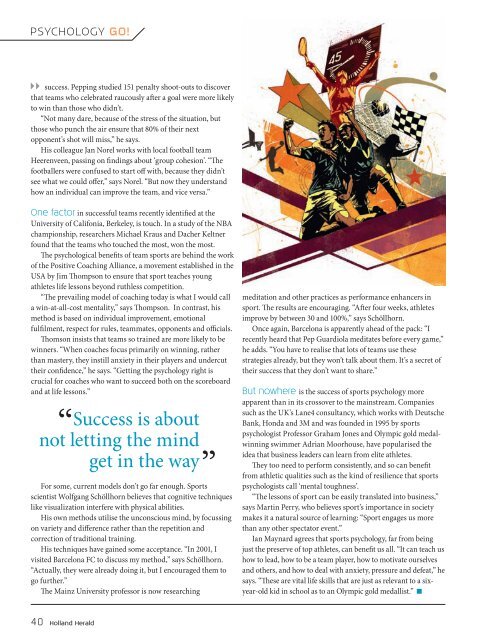june-2012
june-2012
june-2012
You also want an ePaper? Increase the reach of your titles
YUMPU automatically turns print PDFs into web optimized ePapers that Google loves.
PSYCHOLOGY GO!<br />
success. Pepping studied 151 penalty shoot-outs to discover<br />
that teams who celebrated raucously aft er a goal were more likely<br />
to win than those who didn’t.<br />
“Not many dare, because of the stress of the situation, but<br />
those who punch the air ensure that 80% of their next<br />
opponent’s shot will miss,” he says.<br />
His colleague Jan Norel works with local football team<br />
Heerenveen, passing on fi ndings about ‘group cohesion’. “Th e<br />
footballers were confused to start off with, because they didn’t<br />
see what we could off er,” says Norel. “But now they understand<br />
how an individual can improve the team, and vice versa.”<br />
One factor in successful teams recently identifi ed at the<br />
University of Califonia, Berkeley, is touch. In a study of the NBA<br />
championship, researchers Michael Kraus and Dacher Keltner<br />
found that the teams who touched the most, won the most.<br />
Th e psychological benefi ts of team sports are behind the work<br />
of the Positive Coaching Alliance, a movement established in the<br />
USA by Jim Th ompson to ensure that sport teaches young<br />
athletes life lessons beyond ruthless competition.<br />
“Th e prevailing model of coaching today is what I would call<br />
a win-at-all-cost mentality,” says Th ompson. In contrast, his<br />
method is based on individual improvement, emotional<br />
fulfi lment, respect for rules, teammates, opponents and offi cials.<br />
Th omson insists that teams so trained are more likely to be<br />
winners. “When coaches focus primarily on winning, rather<br />
than mastery, they instill anxiety in their players and undercut<br />
their confi dence,” he says. “Getting the psychology right is<br />
crucial for coaches who want to succeed both on the scoreboard<br />
and at life lessons.”<br />
“ Success is about<br />
not letting the mind<br />
get in the way ”<br />
For some, current models don’t go far enough. Sports<br />
scientist Wolfgang Schöllhorn believes that cognitive techniques<br />
like visualization interfere with physical abilities.<br />
His own methods utilise the unconscious mind, by focussing<br />
on variety and diff erence rather than the repetition and<br />
correction of traditional training.<br />
His techniques have gained some acceptance. “In 2001, I<br />
visited Barcelona FC to discuss my method,” says Schöllhorn.<br />
“Actually, they were already doing it, but I encouraged them to<br />
go further.”<br />
Th e Mainz University professor is now researching<br />
40 Holland Herald<br />
meditation and other practices as performance enhancers in<br />
sport. Th e results are encouraging. “Aft er four weeks, athletes<br />
improve by between 30 and 100%,” says Schöllhorn.<br />
Once again, Barcelona is apparently ahead of the pack: “I<br />
recently heard that Pep Guardiola meditates before every game,”<br />
he adds. “You have to realise that lots of teams use these<br />
strategies already, but they won’t talk about them. It’s a secret of<br />
their success that they don’t want to share.”<br />
But nowhere is the success of sports psychology more<br />
apparent than in its crossover to the mainstream. Companies<br />
such as the UK’s Lane4 consultancy, which works with Deutsche<br />
Bank, Honda and 3M and was founded in 1995 by sports<br />
psychologist Professor Graham Jones and Olympic gold medalwinning<br />
swimmer Adrian Moorhouse, have popularised the<br />
idea that business leaders can learn from elite athletes.<br />
Th ey too need to perform consistently, and so can benefi t<br />
from athletic qualities such as the kind of resilience that sports<br />
psychologists call ‘mental toughness’.<br />
“Th e lessons of sport can be easily translated into business,”<br />
says Martin Perry, who believes sport’s importance in society<br />
makes it a natural source of learning: “Sport engages us more<br />
than any other spectator event.”<br />
Ian Maynard agrees that sports psychology, far from being<br />
just the preserve of top athletes, can benefi t us all. “It can teach us<br />
how to lead, how to be a team player, how to motivate ourselves<br />
and others, and how to deal with anxiety, pressure and defeat,” he<br />
says. “Th ese are vital life skills that are just as relevant to a sixyear-old<br />
kid in school as to an Olympic gold medallist.” v

















